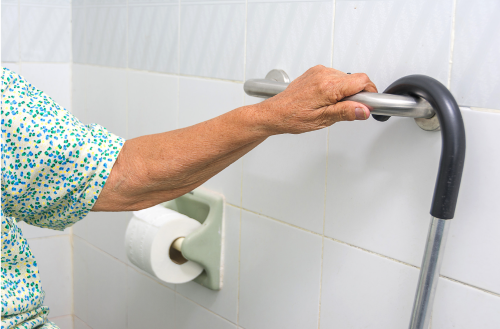6 Tips to Continue Living Safely at Home
Every 11 seconds, an older adult is treated in an emergency department for a fall-related injury. Falls impact a person’s quality of life, whether they result in injury or not. Those who are afraid of falling limit their social engagements and activities. A sense of helplessness may result, as well as further physical decline, depression, and social isolation. In most cases, falling can be prevented through home modifications, health checkups, and self-care. Stay safe with these tips!
In most cases, falling can be prevented through home modifications, health checkups, and self-care. Stay safe with these tips!
1. Choose the right exercise program for you.
Maintain or improve muscle strength, joint flexibility, and posture. Choose a program that you like and invite a friend.
2. Get in touch with your healthcare provider.
Ask for a fall risk assessment. Report falls, near falls, and if you are afraid of falling. Also, report any dizziness or confusion. Check to see if you might benefit from physical therapy, an exercise program, a home safety evaluation, or a cane or walker to help you.
3. Regularly review your medications.
It is important to discuss prescription medications and over-the-counter medications with your physician or pharmacist. Medication should only be taken as prescribed. Check that side effects aren't increasing your risk of falling.
4. Check your vision and hearing.
Make sure your vision and hearing are checked annually and update your eyeglasses if needed.
5. Make your home safer.
Keep walkways free of clutter and tripping hazards, such as throw rugs or keeping items off the stairs. Install grab bars or handrails in key areas and make sure there is good lighting. Keep personal emergency alert pendants or telephones readily accessible in case of emergency.
6. Talk to your family members and friends.
Your closest friends and family members can help you stay independent and safe from falls. Having a conversation about your concerns will help them better assist you.
Other Falling Risks or Situations:
• Lack of adequate nutrition and dehydration.
• Footwear that does not fit or unsupportive.
• Uneven or slippery surfaces such sidewalks, stairs, and bathtubs or showers.
• Living alone with cognitive impairment.
• Not using assistive devices correctly.
To continue living safely at home, visit the following resources or wellness fairs:
Publication: MF3058 Simple Home Modification for Aging in Place, Fact Sheet (ksu.edu)
Website: National Council on Aging Falls Prevention for Older Adults (ncoa.org)
Live Well Age Well Expo
September 7, 2023
10:00 AM to 3:30 PM at Johnson County Arts and Heritage Center
Details at https://jcprd.com/1181/Live-Well-Age-Well-Expo
Falls Prevention Wellness Fair
September 22
9:00 to 11:00 AM at The Shawnee Civic Centre
Details at www.cityofshawnee.org
Article Source: ncoa.org/FallsPrevention